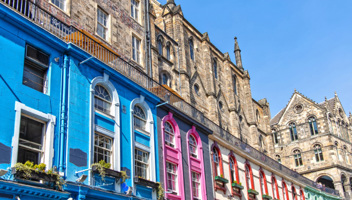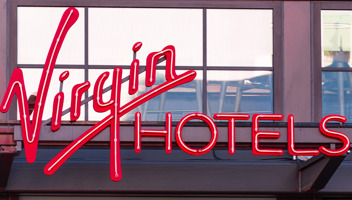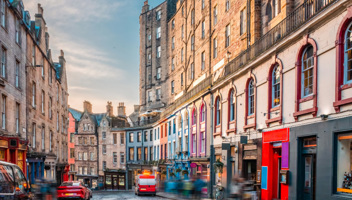It is no secret that hotels are red-hot right now. In turbulent market conditions investors in search of a safe haven are flocking to the relatively secure, long-dated cashflows offered by certain sectors of the hospitality market - especially those assets with inflationary-linked income streams.
Glasgow is at the forefront of the trend, as highlighted by PwC’s most recent UK Hotels Forecast identifying the city as the UK’s leader for hotel room cost growth over the past 12 months.
Glasgow’s revPAR (revenue per available room) - a key indicator of investment value in the sector -climbed by 4.4% to reach an average of £61.77 compared with a national average of £73.13. With an average room occupancy rate of around 80% (well above the UK average of 76%), Glasgow’s hotel sector continues to be an attractive proposition when compared with regional competitors.
Developer sentiment reflects this. There are over 10 new hotels rising into the central Glasgow skyline, with a number of new projects (totalling some 4,000+ rooms) in the final stages of the planning process and primed for development within the next two years.
The trend shows no signs of abating. In what will likely be one of the biggest deals in the sector this year, Burness Paull recently acted in the landmark acquisition and £90m forward funding development of Glasgow’s iconic Custom House, prominently located on the city’s historic Clydeside. Having lain derelict for years the site is springing back into life, with ground now broken for the build phase of a 303 bed hotel (operating under Dublin-based Dalata’s “Clayton” brand) and a second 162 bed apart-hotel (by French operator Adagio).
So, what makes Glasgow such a hotspot for hotels right now?
Glasgow is most definitely seeing some real dividend from the massive government-led investment made over the past two decades, particularly in the service, leisure and events sectors. Building on the tremendous success and legacy of the 2014 Commonwealth Games and with high-calibre venues such as the SSE Hydro, the Emirates Arena / Sir Chris Hoy Velodrome and Hampden Park to name only a few, Glasgow has firmly established itself as the host venue of some of the largest cultural, music and sporting events in the UK (the SSE Hydro alone stages over 140 events annually, attracting well over 1m visitors).
Improvements to the city’s rail link with Edinburgh, with more frequent services and a reduced travel time of 42 minutes, will allow Glasgow to continue to benefit from the huge tourism draw of the nation’s capital. At the same time, the city can continue to establish itself as a destination in its own right (the most recently available ONS data indicates record numbers of international visitors to Glasgow (787,000 in 2017/2018) with linked expenditure increasing by more than a third year-on-year to £319m).
Glasgow retains its status within the top 15 best performing European financial centres, and is ranked by the International Conference and Congress Association at number 28 out of 400 global venues for business conferencing, with 37,000 overseas delegates visiting the city last year.
But it is not just concert-goers, tourists and businesses driving demand.
Unlike many of its regional competitors, the city’s stock of development sites remains healthy, with a large number of sizeable plots still lying dormant since 2008. This, combined with comparatively low land values and well-established development infrastructure, results in Glasgow being an enticing prospect for developers and investors seeking new opportunities and competitive returns.
It is no coincidence the growth of the city’s hotel sector directly correlates with the ongoing redevelopment sweeping out from the city’s core. Since 2011, Glasgow has seen in excess of £10.5 billion of capital investment across housing, retail, health, education, hotels, offices and leisure. The next phase of Glasgow’s Clydeside redevelopment (including Drum Property’s mixed-use development at Buchanan Wharf (with 1m square feet of office space, 350 homes and associated facilities) and Peel’s £100m Glasgow Harbour development – both expected 2021), as well as a host of other mixed use projects in the pipeline, will all help boost the city’s credentials as a destination for business, leisure and modern urban living.
Add to this a resurgence of development appetite, particularly from European and Far East investors due to the weaker pound, and it is no surprise that Glasgow continues its climb up the ranking tables.
But will this influx of new hotel stock have a negative effect on the city’s hotel sector, and how will the sector fare in the mid to long term?
After all, desirable hotel destinations are often a victim of their own success. Take Edinburgh; although retaining its status as the UK’s “second city” for hotels outside London, the city has also seen its revPar slide negatively by 0.3%, partly caused by the massive supply increase of some 3,000 new rooms in the past five years and disruption caused by operators like Airbnb and FlipKey. With a further 2,000 rooms due to arrive within the next two years, competition is growing and driving down pricing – great for visitors, but not so great for investors.
Basic principles of supply and demand mean that Glasgow will, in time, face the same pressures. That said, the organic growth of the Glasgow market to accommodate increasing demand (as opposed to speculative and deliberate oversupply, as has been the case in some UK regions such a Belfast) should allow the city to absorb this new stock without seeing a downward trajectory for its revPar and other key investment metrics.
Crucially, the Glasgow hotel market has adapted its offering to suit the changing requirements of guests. With new market entrants such as Moxy and Yotel meeting the demand for ultra-cool, compact and modestly-priced accommodation, Glasgow has strengthened its offering across the budget and mid level markets, seizing back some of the gains made by Airbnb etc. in recent years.
At the same time, with only two five star hotels (the city centre’s Blysthwood and One Devonshire Gardens in the west end), there remains ample space for development at the higher end of the market.
In the mid-term the weak pound will likely continue to support inbound leisure travel from outwith the UK, however the benefits may well be offset by continued inconsistency in the international business travel market due to Brexit malaise and the tightening of corporate expense policies (ONS data shows a 4% drop in inward business travel to the UK since 2017 – not necessarily a bellwether of prevailing economic conditions, but an interesting and telling statistic nonetheless).
Glasgow’s hotels (and their investors) will have to continue to weather the Brexit storm, grappling with problems stemming from softer economic performance, supply chain difficulties and staffing issues caused by dwindling availability of EU nationals, not to mention the continued squeeze affecting the wider retail / leisure sector.
While it may have topped the investment charts this year, undoubtedly Glasgow’s hotel sector faces some gathering clouds on the horizon. That said, the same clouds hover over the industry as a whole. Provided it retains its competitive edge, low cost-base and developer-friendly environment, the city should be well positioned to ensure the continued positive growth of its hospitality sector, hand-in-hand with the development and regeneration currently sweeping the Clydeside and beyond.
To discuss further we’d love to hear from you.
Written by
Related News, Insights & Events

Edinburgh’s Visitor Levy has passed – What happens now?
Last week, the City of Edinburgh Council (“CEC”) passed Scotland’s first Visitor Levy, using the powers available to it under the Visitor Levy (Scotland) Act 2024 (“the Act”).

Burness Paull advises on sale of former Virgin Hotel in Glasgow
21/01/2025
Burness Paull advised on the sale of the former Virgin Hotel in Glasgow to a Martin Property Group entity, which completed on 23 December 2024.

Scotland’s first Visitor Levy – How did we get here?
In the coming weeks, the City of Edinburgh Council (“CEC”) is set to introduce Scotland’s first Visitor Levy.





